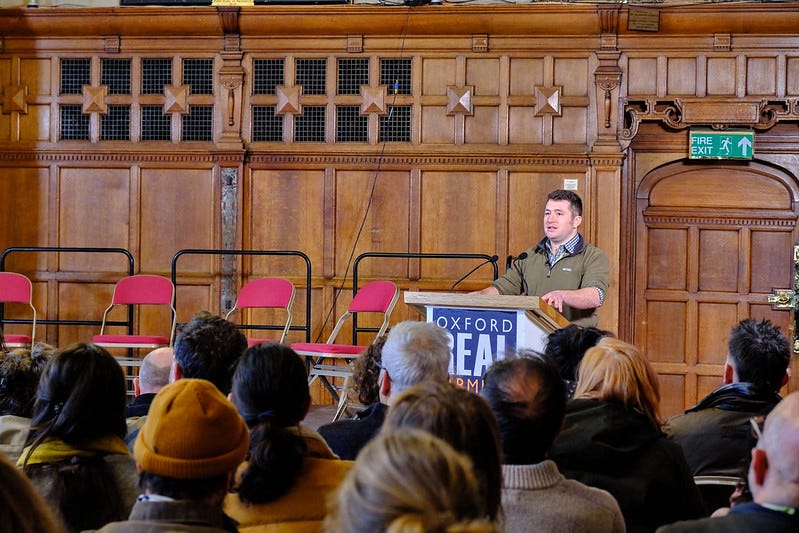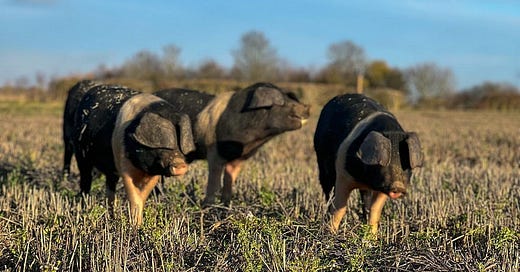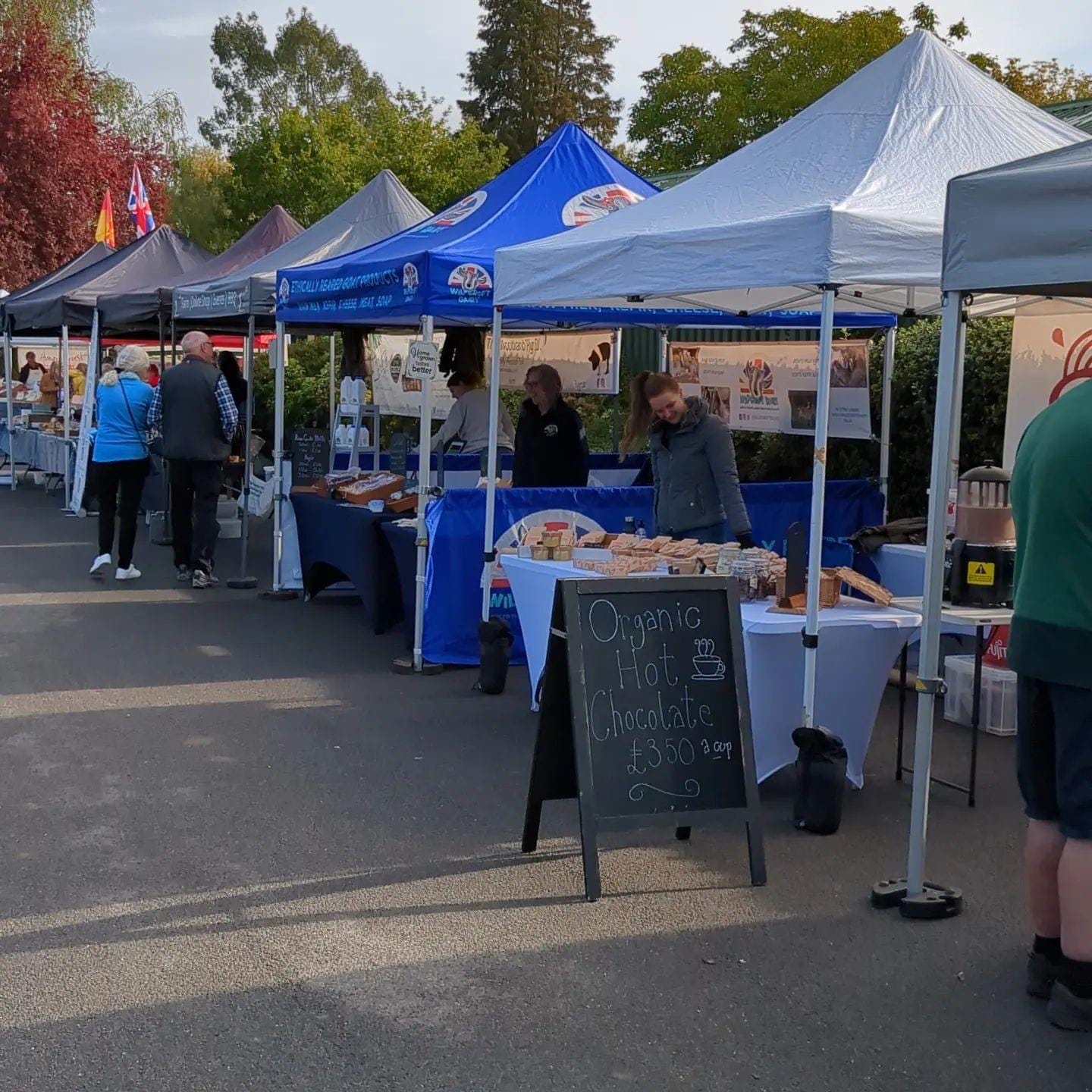This post is part of my “Future of Farming” series, where I dig into the future of agriculture, food security, and policy. If you’re new here, catch up on the rest of the series:
Food Security and Small Farms
Feel free to explore each one for a deeper look at where farming is headed!
Why Food Security Matters Now
As someone who’s seen the challenges of farming up close, I can’t ignore the reality that the UK now imports 40% of its food while small farms like mine are disappearing. The future of farming feels like it’s at a crossroads.
Food security may sound like a buzzword, but for farmers like me, it is a daily reality. When I read headlines about farmers dumping milk or hear about another field lost to housing developments, it hits close to home. These aren’t just stories in the news they are the challenges shaping the future of how we grow and access food.
Food security, the ability to ensure consistent access to sufficient, safe, and nutritious food, is a critical issue for the UK. It is not just about having enough food; it is about where that food comes from, how it is produced, and who benefits.
As someone who has spent years on a small farm, I have lived through the pressures of farming firsthand. From planning battles to the financial uncertainty of keeping livestock, I have experienced how the choices we make as farmers, consumers, and policymakers ripple through the entire food system. This series is my way of unpacking those choices and exploring what they mean for all of us.
The Challenges Facing Small Farms
Small farms are often described as the backbone of local food systems, but let me tell you—it can feel like we are carrying the weight of the world on our shoulders. Here are just a few of the hurdles we face:
Planning Battles and Land Loss: Farmland is increasingly being swallowed up by housing developments, leaving farmers fighting to protect their livelihoods. I have been there, caught in the middle of planning disputes that threaten not just my farm but the very principles of sustainable, local food production.
Lack of Support for Regenerative Practices: Regenerative farming is a buzzword right now, but for many small farms it is a way of life. The problem? Funding and subsidies often do not reach the farms that need them most.
Market Pressure from Supermarkets: Competing with cheap imports and supermarket pricing is a constant battle. Small farms, like mine, focus on quality and ethics, but the market does not always reward those values.
Infrastructure Challenges: The decline of local abattoirs is a perfect example. Without them, small farmers are forced to transport animals longer distances, adding stress for both livestock and farmers.
These are not just abstract problems, they are the daily realities of farming in the UK. On my farm, I have seen the value of working with nature, from using pigs to clear fields post-harvest to spreading nitrate-rich manure that nourishes the soil. But even the best practices can only go so far without systemic support.
As the Food, Farming and Countryside Commission (FFCC) so aptly put it, "Food security isn’t just about producing enough—it’s about producing the right food, in the right way, for the right people" (FFCC).
High-Welfare Farming as a Solution
When people hear "high-welfare farming," they often think of happy animals. And yes, that is part of it. But it is also about so much more:
Soil Health and Biodiversity: Practices like rotational grazing and reduced antibiotic use do not just benefit animals, they improve soil quality and support entire ecosystems.
Local Supply Chains: By reducing reliance on imports and shortening food miles, high-welfare farms contribute to more resilient food systems.
Consumer Trust: Ethical and sustainable practices align with growing consumer demand for transparency and quality in food production.
On my farm, high-welfare practices are at the heart of what we do. Our Saddleback pigs, with their friendly personalities and natural foraging abilities, play a key role in our arable rotations. Watching them root around in the soil, you can see the immediate impact they have breaking up compacted ground, fertilising the fields, and preparing the land for the next crop.
I chose Saddlebacks not just because they are a native UK breed, but because they fit perfectly into a system that values both the land and the animals. Healthy pigs mean healthy soil, and healthy soil means healthier food for everyone.
Research from organisations like Sustainable Food Trust and Wicked Leeks backs this up. High-welfare farming is not just a feel-good story, it is a practical, scalable solution for food security. But scaling it requires investment in infrastructure, like local abattoirs, and policy changes that support small producers.
Join the Journey
This series is not just about farmers—it is about all of us. Whether you are a consumer, policymaker, or someone who cares about the planet, your choices and voice matter.
In the coming weeks, we will explore:
Farming in Crisis: How current policies are shaping and sometimes breaking the future of British agriculture.
The Future of Livestock Farming: Balancing ethical practices with the realities of demand and sustainability.
Farming Without Borders: What we can learn from global agricultural practices to inspire change at home.
The Future of Farming Education: Reimagining how we teach and share farming knowledge to empower the next generation.
If you care about the future of food in the UK, this is your series. Together, we can explore the challenges and opportunities facing our food system and, hopefully, inspire action.

Call to Action
What does food security mean to you? What is the biggest challenge you think British farming faces today? Let me know in the comments—I would love to hear your thoughts.
Share this post with someone who cares about where their food comes from, and do not forget to subscribe to stay updated.
The future of farming is not just an abstract concept, it is being decided right now, by the policies we support, the food we buy, and the conversations we have. Let us dig into these challenges together and build a food system that works for everyone—farmers, consumers, and the planet alike.
Sources: Wicked Leeks, Sustainable Food Trust, Food, Farming and Countryside Commission.







Totally agree with you but CONSUMERS need to change their behaviour as ultimately they can influence policy by choosing where to put their money. We have become an obese and sick nation of people who want cheap, processed food who put hot tubs and paving over what green space they have. Until they start valuing healthy, high welfare food and the natural world the supermarkets and high street chicken outlets will win.
Totally agree with the challenges you discuss here. Until we have policies that support small producers it’s massively difficult to keep going. People need to be able and prepared to pay the real cost of ethical, high-welfare production, but much of the UK seems locked into a cycle of the cheapest possible food and not caring where or how it has been produced. With the cost of living becoming a real strain for many, this just gets ever more difficult.